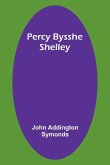In "Percy Bysshe Shelley," John Addington Symonds offers a comprehensive and nuanced exploration of the life and works of the iconic Romantic poet. Through eloquent prose and a meticulous examination of Shelley's themes-such as idealism, nature, and the critique of social norms-Symonds contextualizes Shelley within the broader tapestry of the Romantic movement. His literary style blends biographical narrative with critical analysis, revealing not only the poet's tumultuous life but also the philosophical underpinnings that shaped his revolutionary ideas. The work sits comfortably within the late 19th-century intellectual discourse, bridging the gap between Romanticism and the emerging modernist thought. John Addington Symonds (1840-1893) was a noted English poet, biographer, and an early advocate for aestheticism. His deep admiration for Shelley's pioneering spirit and radical optimism often reflected his own struggles with societal conventions, which were exacerbated by his own experiences with sexuality and identity. Symonds sought to illuminate Shelley's legacy at a time when his works were often overshadowed, emphasizing not only their artistic merit but also their enduring relevance in the face of societal constraints. Symonds's engaging prose and insightful critiques make "Percy Bysshe Shelley" an essential read for anyone captivated by the complexity of Romantic poetry and its major figures. Scholars, students, and lay readers alike will find in this text a profound declaration of Shelley's vision, alongside a compelling narrative that invites readers to reflect on the implications of his work for contemporary society.
Bitte wählen Sie Ihr Anliegen aus.
Rechnungen
Retourenschein anfordern
Bestellstatus
Storno








